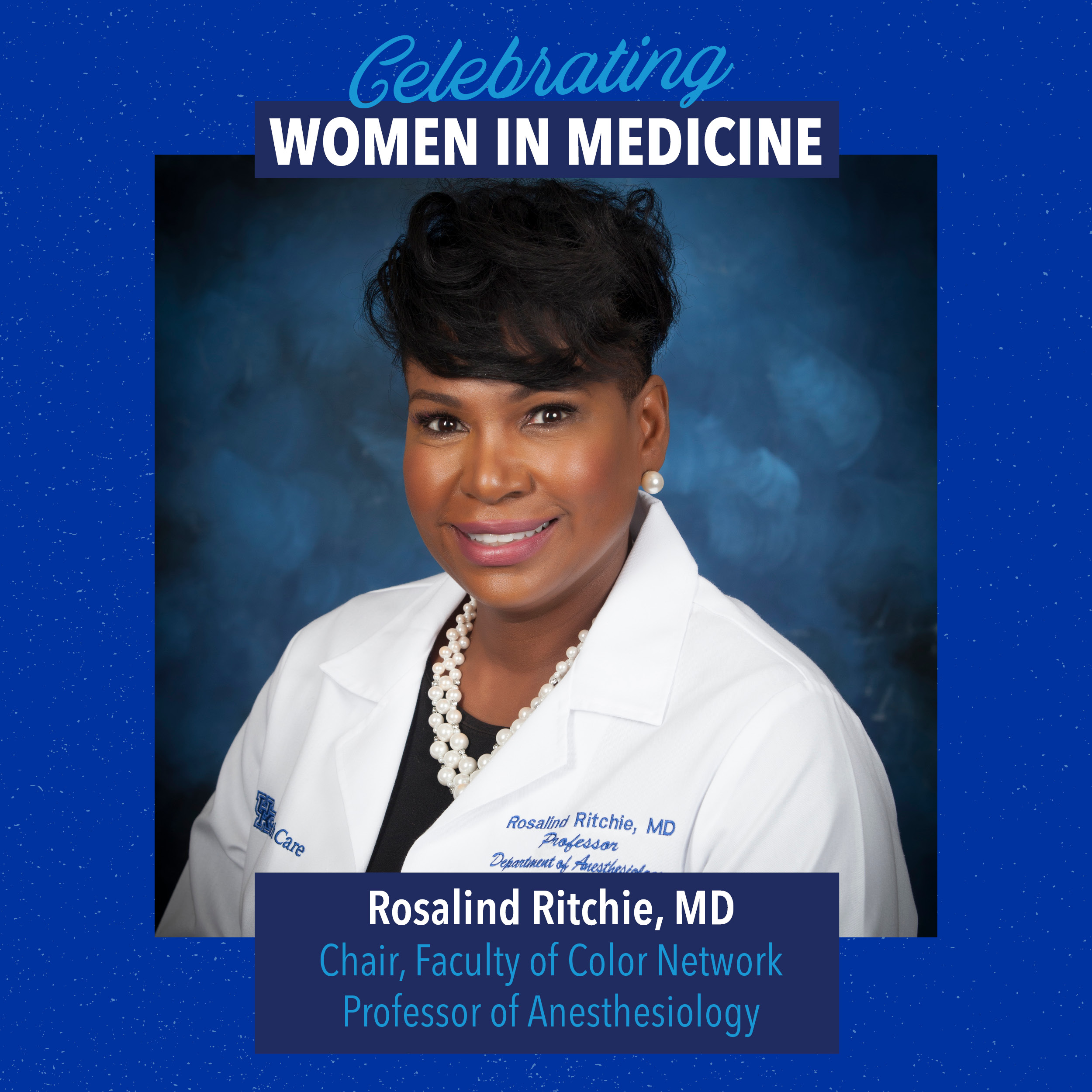Women in Medicine Month Spotlight: Dr. Rosalind Ritchie
Rosalind Ritchie, MD, is a professor in the University of Kentucky College of Medicine Department of Anesthesiology and was recently named chair of the college’s Faculty of Color Network, an organization with a vision of being undeniable, uncompromising, and unstoppable in pursuing diversity and inclusion. She enrolled in the first class of UK’s Women’s Executive Leadership Development Program and is the medical director of UK Chandler Hospital’s Center for Advanced Surgery.
September is Women in Medicine Month. To commemorate the achievements of women in the medical field, Dr. Ritchie shares a first-person account on why she became a physician and discusses her continuous work to help other women advance their careers in academia, health care, and leadership.
As I reflect upon my career as a physician, I struggled with deciding whether I should paint a rosy picture, that "single story" that we have all heard, or be candid and share a story that others might not have heard. A Nigerian writer, Chimamanda Adichie, said, "the single story creates stereotypes, and the problem with stereotypes is not that they are untrue, but they are incomplete. They make one story become the only story."
I started my medical education career as a single mother. There, I said it. From the very beginning, my medical and educational journey did not begin the same as many of my peers. Because of my gender, race, single motherhood, and whatever else you can imagine, I was told I could not, should not even contemplate the thought of becoming a physician.
Their reasons were valid if you had read only the "single story," which shaped most of our ideas about the people, the religions, and the races of the world we live. Despite the foretold story of myself, I decided to rewrite my story with the Grace of God, family, and friends.
My pursuit of medicine began during my teen years. My beloved mother, Dollie Ritchie, died at the age of 40 from breast cancer. Caring for my mother somehow intertwined my life with the story of medicine. It became apparent to me that women and people of color were underrepresented individuals within the medical field.
Women's role in medicine is evolving, yet there is still much work to be done for women of color. If we had not seen the world as it is and had not accepted it as is, we would not be observing the 100th anniversary of the 19th Amendment, which gave White women the right to vote.
Because the single story is continuing to be rewritten or even disappearing, women for the first time in history are the majority of enrolled U.S. medical students (51%), according to 2019 data released by AAMC. No doubt, this is a significant milestone to be celebrated. However, Hispanic/Latino/Spanish rose 6.3%, American Indian/Alaska Native rose 5.5%, while Black/African-American rose only 3.2%. This modest increase in the enrollment of underrepresented groups will not meet the need to care for a more diverse America. So, there is more work to be done.
The University of Kentucky College of Medicine's Faculty of Color Network, recently established in 2018, is committed to professional development, scholarship, community, and advocacy. As chair, along with my peers, we will continue to rewrite that incomplete "single story."
Research has shown that increasing diversity in the health care workforce for physicians, professors, and scientists is an effective strategy to address health care racial, socioeconomic, and ethnic disparities and the ability to meet all Americans' needs. We will continue to work with the College of Medicine and UK HealthCare on Diversity and Inclusion initiatives.
Activist Verna Myers wrote the famous quote, "Diversity is being asked to the party, inclusion is being asked to dance." But I would like to share something I recently learned from a promising UK student. "Dancing like nobody is looking is belonging.” We can meet the diversity quota and even inclusivity but belonging will take work.
I make an effort each day to uplift, encourage, and listen from the beginning to the end of stories for all women. The knowledge that there is more in the world than the "single story" has shaped my work as a physician, friend, and colleague. I will continue to bring forth voice and advocacy for the names of the women I know for positions, opportunities, and promotions.
I am fortunate to say that I have many highlights and proud moments in my career as a physician and professor. It's most enlightening to see when a student or colleague realizes their journey doesn't need to be like the "single story" journey. Your story and your story alone can bring forth goals, aspirations, and success.
Thank you for this opportunity to share my story with all of you. It brings me both joy and honor to be a woman in medicine. My experience as a participant in the Women in Executive Leadership Program established by Women in Medicine and Science (WIMS) has granted me many rewards and advancement opportunities. For many women, especially Black and Brown women, stories have not been read or heard.
Be careful, the “single story” is dangerous. It marginalizes parts of humanity. So, I humbly ask, let us move forward by listening to the stories from the beginning to the end of all women.
